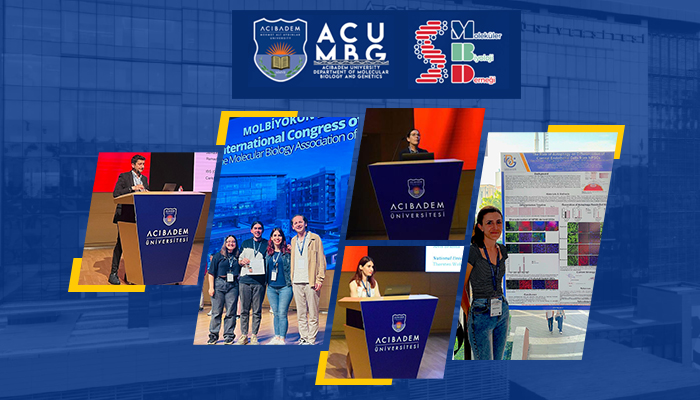The Success of IBG Researchers at the 8th International Congress of the Molecular Biology Association of Turkey

Researchers from Ozhan Lab., Guven Lab. and Senturk Lab. have been awarded two poster prizes and three PIs from IBG were among the main speakers at the 8th International Congress of the Molecular Biology Association of Turkey.
This year, the International Congress of the Molecular Biology Association of Turkey was held between 9th and 12th of June, at Acibadem University, Istanbul. The congress was attended by more than 500 international and national attendees, including many researchers from IBG. Prof. Dr. Mayda GÜRSEL, Assoc. Prof. Güneş ÖZHAN and Dr. Seyit KALE from IBG were among 25 speakers attended from 21 different institutions and 8 different countries.
Members of Development and Regeneration Lab. at IBG; Doğaç İPEKGİL, Dilek NAZLI, Yusuf Kaan POYRAZ, Dr Evin İŞCAN, Dr Ebru TURHANLAR ŞAHİN and Assoc. Prof. Güneş ÖZHAN; were awarded the “FEBS Journal First Poster Prize” for their work entitled "Investigation of the role of p75NTR homolog Nradd during degeneration and regeneration responses in Alzheimer’s disease (AD) in a zebrafish model of amyloid-β42 toxicity" at the congress. This study will be the first to reveal the roles of Nradd in various stages of AD including neuronal degeneration and regeneration by exploiting the zebrafish that has a high regeneration capacity. The successful outcome of this work will shed light on the development of new treatment options against AD.
Moreover, a collaborative study including Therapeutic Bioengineering Lab. group members; Assoc. Prof. Sinan GÜVEN, Assoc. Prof. Canan Aslı UTINE and Gamze KOÇAK & Functional Cancer Genomics Lab members; Assoc. Prof. Şerif ŞENTÜRK and Ece ÇAKIROĞLU received the 2nd best poster award for their poster presentation entitled “The Role of Autophagy on Differentiation of Corneal Endothelial Cells from hiPSCs”. The researchers aim to differentiate human induced pluripotent stem cells (iPSC) to corneal endothelial cells and generate autophagy gene knock-out cells using CRISPR/Cas9 genome editing technology. This study is pioneering the establishment of autophagy-deficient model in iPSC derived corneal endothelial cells and understanding the role of autophagy in cell differentiation.